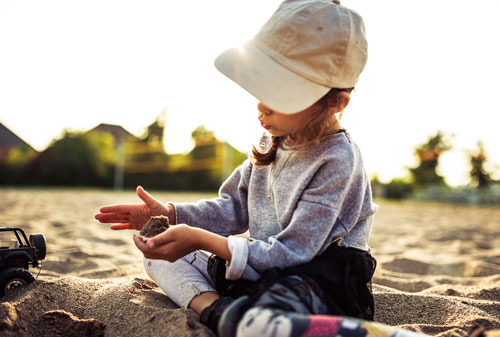




One of the Government’s core features for children and young people that’s based on the United Nations Convention on the Rights of the children, is that they aim to ensure that all children and young people ‘have access to play, leisure, sporting and cultural activities. https://bit.ly/2VAlHLR
Play is full of fun and is extremely valuable to children. It contributes towards the whole development of the child. In order to ensure successful play, careful planning work is needed.
Physically – Fine motor skills and hand-eye coordination will develop by playing with small toys and resources such as blocks, beads and peg boards. Children’s gross motor skills, balance and movement will develop through energetic play activities.
Intellectually – Children will develop thinking skills by touching and exploring the world around them. Concepts such as size, space, volume, texture and colour will develop through play activities such as painting, playing with water and craft activities. They will encounter cause and effect and how concepts can change e.g. how sand changes if water is poured onto it.
Linguistically – Children develop communication skills by speaking to each other, and to people around them, and by listening to each other and to others. Imaginative play gives the children an opportunity to use language, such words and phrases that they do not understand but that they use during play activities.
Emotionally – Play gives children an opportunity to attempt new things without the fear of being wrong and failing, so they develop confidence and self-respect - and feel good about themselves. Imaginative play gives children an opportunity to explore their emotions, and to express and act out how they feel.
Socially – Children will learn to work as a team by solving problems when playing. Skills such as sharing, taking turns and listening to others' ideas will be mastered. By working in small and large groups, children will learn that they need to cooperate in order to accomplish tasks. As children get older, they use play as a means of socialising; they can escape the pressures of life and it is a way of relaxing. Children may prefer to play on their own or with others.
Culturally – By playing, children will be able to learn about the world. They will be able to dress up in the role play area, or play different instruments from different countries. By doing so, they will consider how other children play and will raise their awareness of other cultures.
Behaviourally – Children need access to challenging activities that will encourage them to concentrate and to play independently. On the other hand, it is essential that the activity is not too challenging as this may frustrate the child. If the child is enjoying himself/herself, they will learn. Bad behaviour often stems from boredom or frustration. Therefore, it is important to ensure that the activities are entertaining and varied.
Un o nodweddion craidd y Llywodraeth ar gyfer plant a phobl ifanc sy’n seiliedig ar Confensiwn y Cenhedloedd Unedig a’r Hawliau’r plentyn yw, ei fod yn anelu at sicrhau bod pob plentyn a pherson ifanc yn ‘cael ei fanteisio ar amrediad o weithgareddau chwarae, hamdden, chwaraeon a gweithgareddau diwyllianol. https://bit.ly/2NUQ2lD
Mae chwarae yn llawer o sbri ac yn werthfawr iawn i blant. Mae’n cyfrannu tuag at ddatblygiad cyflawn y plentyn. Er mwyn sicrhau bod y chwarae’n llwyddiannus mae angen cynllunio’n ofalus.
Gorfforol – bydd sgiliau echddygol manwl a chydsymud llaw a llygad yn datblygu wrth chwarae gyda theganau bach ac offer megis blociau; gleiniau; bwrdd pegiau. Sgiliau echddygol bras; cydbwysedd a symudiad yn datblygu drwy weithgareddau chwarae egnïol.
Ddeallusol – bydd plant yn datblygu sgiliau meddwl drwy gyffwrdd ac archwilio'r byd o'u cwmpas. Bydd cysyniadau megis maint, gofod, cyfaint, gwead a lliw yn datblygu drwy weithgareddau chwarae megis peintio, chwarae gyda dŵr a gweithgareddau crefft. Byddant yn dod ar draws achos ac effaith; a sut mae cysyniadau yn medru newid e.e. sut mae tywod yn newid os arllwysir dŵr arno.
Ieithyddol – mae plant yn datblygu sgiliau cyfathrebu drwy siarad â'i gilydd, ac â phobl o'u cwmpas, ac wrth wrando ar ei gilydd ac ar eraill. Mae chwarae dychmygu yn rhoi'r cyfle i blant roi cynnig ar iaith; geiriau ac ymadroddion nad ydynt yn deall ond y maent yn eu defnyddio yn ystod gweithgareddau chwarae.
Emosiynol – mae chwarae yn rhoi cyfle i blant roi cynnig ar bethau newydd heb ofni bod yn anghywir a methu, felly maent yn datblygu hyder a hunan-barch - teimlo'n dda am eu hunain. Mae chwarae dychmygu yn rhoi cyfle i blant archwilio eu hemosiynau, mynegi ac actio sut maent yn teimlo.
Gymdeithasol – bydd plant yn dysgu gweithio mewn tîm gan ddatrys problemau wrth chwarae. Bydd sgiliau megis rhannu, cymryd tro a gwrando ar syniadau eraill yn cael eu meistroli. Trwy weithio mewn grwpiau bach a mawr bydd y plentyn yn dysgu bod angen gweithio gyda’i gilydd i gyflawni tasgau. Wrth i blant fynd yn hŷn, maent yn defnyddio chwarae fel ffordd o gymdeithasu; maent yn gallu dianc o bwysau bywyd ac mae'n ffordd o ymlacio. Efallai bydd plant yn ffafrio chwarae ar eu pen eu hunain neu gydag eraill.
Ddiwylliannol – trwy chwarae bydd plant yn medru dysgu am y byd. Gallant wisgo i fyny yn yr ardal chwarae rôl, neu chwarae offerynnau o wahanol wledydd .Trwy hyn byddant yn ystyried sut mae plant eraill yn chwarae gan godi eu hymwybyddiaeth o ddiwylliannau eraill.
Ymddygiadol – mae angen i blant gael mynediad at weithgareddau heriol a fydd yn eu hannog i ganolbwyntio a chwarae yn annibynnol. Ar y llaw arall mae’n hanfodol nad yw’r gweithgaredd yn rhy heriol gan y gallai wneud y plentyn yn rhwystredig. Os fydd y plentyn yn mwynhau bydd yn dysgu. Mae ymddygiad drwg yn aml yn digwydd oherwydd eu bod wedi diflasu neu eu bod yn rhwystredig. Felly, mae'n bwysig gofalu bod y gweithgareddau yn ddifyr ac yn amrywiol.
Drag the benefits of play to match the explanation.
Cysylltwch y buddion chwarae gyda’r esboniad cywir.
Warning! This resource is not optimised for use on mobile devices.
Rhybudd! Ni ellir defnyddio’r adnodd yma ar ffonau symudol neu dabled.
Well done. You have matched them all correctly.
Da iawn. Rydych wedi paru pob un yn gywir.
Benefits of play Buddion Chwarae |
Explanation Esboniad |
Correct answers Atebion cywir |
|---|